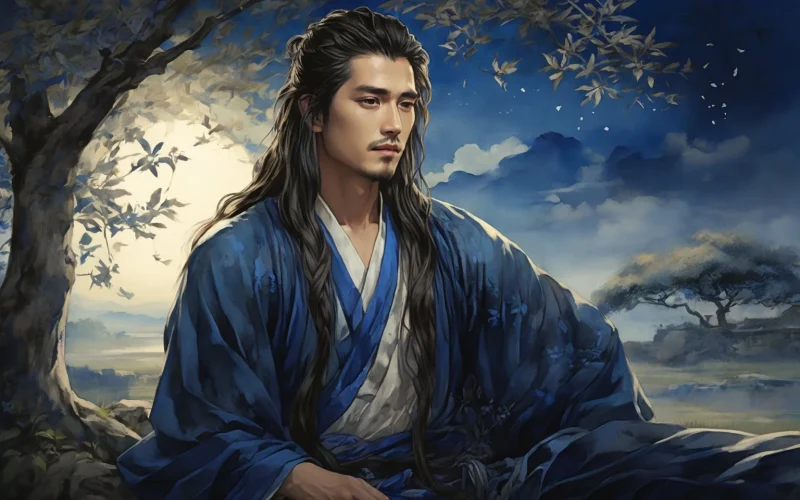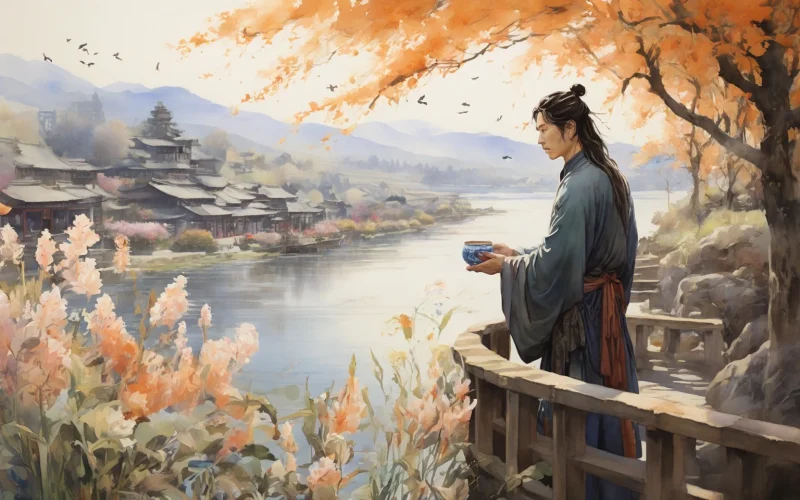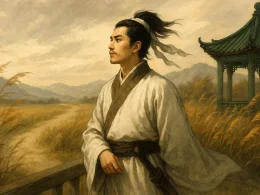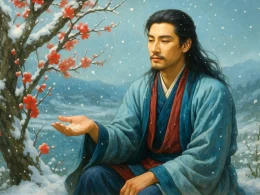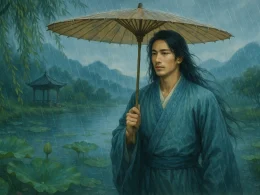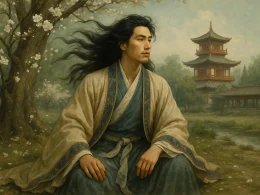Li He (李贺), 791 AD - 817 AD, a romantic poet of the mid-Tang Dynasty, hailing from Luoyang, Henan. Alongside Li Bai and Li Shangyin, he is known as one of the "Three Lis" of the Tang Dynasty. As a representative figure during the transition from mid-Tang to late-Tang poetic styles, his works often express a deep sense of frustration over being born in an unfavorable era and convey his inner turmoil. His poetry reflects his relentless pursuit of ideals and ambitions while also shedding light on the fragmentation caused by warlordism, the dominance of eunuchs in court politics, and the severe oppression suffered by the common people.
李贺
lǐ hè
主要作品:
Brief Biography:
Li He (790–816), courtesy name Changji, was a renowned poet of the Tang Dynasty. He was born in Changgu, Fuchang (modern-day Yiyang, Henan) and was later known as the “Poet of Changgu.” His family claimed descent from the royal lineage of Prince Zheng, Li Liang, but as a non-direct descendant, his family status was neither prominent nor wealthy.
From an early age, Li He displayed extraordinary talent in poetry. By the age of five or six, he could compose verses, earning him a reputation as a child prodigy. He was highly regarded by literary figures such as Han Yu and Huangfu Shi, who visited him personally. Although historical records do not detail his formal education, it is evident that he was deeply influenced by Confucian classics and earlier poetic traditions, including Chu Ci and the poetry of the Han and Six Dynasties periods, which shaped his unique poetic style.
During the Tang Dynasty, the imperial examination was the primary pathway to officialdom, and Li He aspired to participate. However, he was prevented from doing so due to a rule prohibiting candidates from using a character found in their father’s name. His father’s name, Jin Su, contained a character that made him ineligible. This setback deeply frustrated Li He, and his poetry often reflects sorrow and resentment toward this injustice.
Despite this obstacle, Li He was eventually recommended for an official position and was appointed Fengli Lang (a minor ceremonial post in the imperial court) in 810. However, this role was largely honorary, lacking real political influence or opportunities for advancement. Already physically frail, Li He struggled under the burdens of duty and disappointment in his career. In 816, he resigned due to illness and returned home, where he passed away at the young age of 27—a tragic loss to Chinese literature.
Representative Works:
Although Li He’s body of work is not extensive, his poetry is distinctive, filled with vivid imagery and unique expressions. Some of his most representative poems include:
- “Yanmen Taishou Xing” (Song of the Governor of Yanmen)
- A frontier poem that portrays the tense and tragic atmosphere of warfare with dramatic and surreal imagery. The famous lines, “Black clouds press upon the city as if it will collapse; Armor gleams like golden scales in the sunlight,” create a powerful, battle-ready scene.
- “Ma Shi” (Twenty-three Poems on Horses)
- A series of poems that metaphorically express his personal aspirations and frustrations through various depictions of noble yet constrained horses, symbolizing talented individuals unable to achieve their potential.
- “Jintong Xianren Ci Han Ge” (Farewell Song of the Bronze Immortal of Han)
- This poem mourns the removal of the Bronze Immortal statue from the Han Dynasty’s palace, serving as a lamentation for the passage of time and the fall of empires.
- “Su Xiaoxiao Mu” (Tomb of Su Xiaoxiao)
- Inspired by the story of Su Xiaoxiao, a famous courtesan of the Southern Qi Dynasty, this poem reflects on the transience of beauty and life’s inevitable decline.
- “Meng Tian” (Dreaming of Heaven)
- A surreal poem that constructs an otherworldly celestial landscape with fantastic imagery, showcasing Li He’s imaginative and mystical style.
Poetic Style:
Li He’s poetry is often described as eerie, fantastical, and melancholic, earning him the reputation of a “ghostly genius.” His style is characterized by the following:
- Fantastic and Surreal Imagination
- His works frequently incorporate supernatural and mythological elements, creating a dreamlike and mysterious atmosphere. “Meng Tian” (Dreaming of Heaven) is a prime example, presenting a celestial realm filled with divine imagery.
- A Deep Sense of Tragedy
- Many of his poems are imbued with sorrow and despair, lamenting the fleeting nature of life, missed opportunities, and political injustices. In “Jintong Xianren Ci Han Ge”, he mourns the fall of the Han Dynasty, while “Ma Shi” symbolizes unfulfilled ambitions.
- Concise and Unique Expressions
- His use of language is both refined and unconventional, often employing rare and striking words to create an extraordinary aesthetic effect. For instance, in “Li Ping Konghou Yin” (Song of Li Ping’s Konghou), he writes, “Wu silk and Shu paulownia stretch high in autumn, empty mountains condense clouds that do not drift,” crafting an eerie and ethereal scene.
- Influence of Yuefu (Music Bureau) Poetry
- Strongly influenced by traditional Yuefu poetry, his works have a distinct musicality and rhythmic power. This is particularly evident in his frontier and historical poems, where his verse resonates with forceful cadence, such as in “Yanmen Taishou Xing”.
Literary Achievements:
- Establishing the "Changji Style"
- Li He’s poetry was so unique that it was later labeled the Changji Style (after his courtesy name, Changji). His poetic innovations set him apart from his contemporaries and influenced later poetic traditions.
- Influence on Later Generations
- His work significantly impacted later poets, including those of the Song and Ming-Qing Dynasties. His evocative use of imagery and surreal style influenced poets like Li Shangyin and even certain elements of classical Chinese fiction.
- A Unique Place in Tang Poetry
- Among the great poets of the Tang Dynasty, Li He is often compared to Li Bai and Du Fu, forming a literary trio known as the "Three Lis." While Li Bai embodies free-spirited romanticism and Du Fu represents solemn realism, Li He stands out with his ghostly, dreamlike aesthetic, making him an irreplaceable figure in Chinese literary history.
Conclusion:
Though Li He’s life was brief and filled with hardships, his poetry carved out an unparalleled space in the world of literature. His verses transport readers into mystical realms, blending fantasy with sorrow and infusing traditional themes with unprecedented intensity. His unique blend of the supernatural, historical reflection, and personal lamentation ensures that his poetry remains an essential part of Chinese literary heritage. Despite the challenges he faced in life, his works continue to be celebrated, inspiring generations of poets and readers alike.






